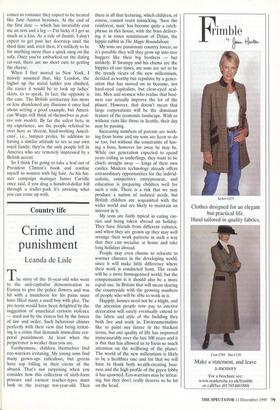Country life
Crime and punishment
Leanda de Lisle
The story of the 16-year-old who went to the anti-capitalist demonstration in Euston to give the police flowers and was hit with a truncheon for his pains must have filled many a small boy with glee. The pre-teens would have been delighted by the suggestion of anarchical cartoon violence — used not by the rioters but by the forces of law and order. Such behaviour chimes perfectly with their view that being irritat- ing is a crime that demands immediate cor- poral punishment. At least when the perpetrator is weaker than you are.
Furthermore; children themselves find cco-warriors irritating. My young sons find many grown-ups ridiculous, but greens have top billing in their circus of the absurd. That's not surprising when you consider how this collection of sixth-form poseurs and earnest teacher-types must look to the average ten-year-old. Then
there is all that lecturing, which children, of course, cannot resist mimicking. 'Save the rainforest, man' has become quite a catch- phrase in this house, with the boys deliver- ing it in tones reminiscent of Dylan, the hippie rabbit in The Magic Roundabout.
My sons are passionate country lovers, so it's possible they will they grow up into tree huggers like their big brothers — but unlikely. If Swampy and his chums are the hippies of our times, my sons are set to be the trendy vicars of the new millennium, derided as worthy but repulsive by a gener- ation that has moved on to become, not hard-eyed capitalists, but clear-eyed real- ists. Men and women who realise that busi- ness can actually improve the lot of the planet. However, that doesn't mean that large corporations will be the dominant feature of the economic landscape. With or without riots like those in Seattle, their day may be passing.
Increasing numbers of parents are work- ing from home and my sons are keen to do so too, but without the constraints of hav- ing a boss, however far away he may be. While our generation expected to spend years toiling as underlings, they want to be chiefs straight away — kings of their own castles. Modern technology already offers extraordinary opportunities for the individ- ualistic, competitive entrepreneur, and education is preparing children well for such a role. There is a risk that we may produce a nation of isolated nerds, but British children are acquainted with the wider world and are likely to maintain an interest in it.
My sons are fairly typical in eating cur- ries and being taken abroad on holiday. They have friends from different cultures, and when they are grown up they may well arrange their work patterns in such a way that they can socialise at home and take long holidays abroad.
People may even choose to relocate to warmer climates in the developing world, since it will make little difference where their work is conducted from. The result will be a more homogenised world, but the compensation is it should also be a more equal one. In Britain that will mean sharing the countryside with the growing numbers of people who will be able to work in it.
Happily, houses need not be a blight, and the attention people now pay to interior decoration will surely eventually extend to the fabric and style of the building they both live and work in. Environmentalists like to paint our future in the blackest terms, but our quality of life has improved immeasurably over the last 100 years and it is this that has allowed us to focus so much attention on the wellbeing of the planet. The world of the new millennium is likely to be a healthier one and for that we will have to thank both wealth-creating busi- ness and the high profile of the green lobby it has spawned. Eco-warriors may be irritat- ing, but they don't really deserve to be hit on the head.


























































































 Previous page
Previous page